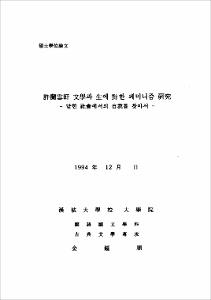許蘭雪軒 文學과 生에 對한 페미니즘 硏究
- Files in This Item:
-
-
Download
 000000066285.pdf
기타 데이터 / 3.16 MB / Adobe PDF
000000066285.pdf
기타 데이터 / 3.16 MB / Adobe PDF
-
Items in Repository are protected by copyright, with all rights reserved, unless otherwise indicated.
 000000066285.pdf
기타 데이터 / 3.16 MB / Adobe PDF
000000066285.pdf
기타 데이터 / 3.16 MB / Adobe PDFItems in Repository are protected by copyright, with all rights reserved, unless otherwise indicated.